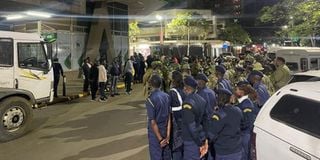Premium
Nairobi night clubs' owners: 23, 000 jobs, Sh1.6bn to be lost over Sakaja ban

Governor Johnson Sakaja addresses city askaris and police officers ahead of the raid on noisy bars. Nightclubs have been banned from operating in residential areas as from November 29, 2022.
Nightclubs that have been banned from operating in residential areas may have to lay off about 23,000 employees, leading to a total loss of more than 1.6 billion shillings.
In a press statement to newsrooms, the national chairman of Pubs Entertainment and Restaurants Association of Kenya (Perak), Mr Michael Muthami, said the ban on nightclub licences will cut sales to as low as those witnessed when Covid-19 first hit Kenya, and that consumption of alcohol may decline by as much as 30 per cent.
“Four hundred outlets or 3.3 per cent of bars in Nairobi are licensed as nightclubs. It is estimated that each of the 400 nightclubs in Nairobi employs 50-80 full-time employees (a total average of 26,000 people) and 20-30 temporary employees (a total average of 10,000 people).
A full-time employee earns an average of Sh30, 000 a month, while temporary employees earn an average of Sh10, 000 a month. Therefore, full-time and temporary employees in nightclubs earn on average a total of Sh780 million and Sh100 million every month respectively,” said Mr Muthami.
“Perak estimates that it will lay off 50 per cent (13,000 jobs, Sh390 million a month) of its full-time workforce in nightclubs due to the ban on nightclub licences in Nairobi. It further estimates that 100 per cent (10,000 jobs, Sh100 million a month) of the temporary employee will not be required due to the reduction in operations within nightclubs. 73.6 thousand indirect jobs representing Sh1.6 billion a month in indirect employment income will be lost in Nairobi,” he explained.
Revenue losses
Besides robbing people of their livelihoods, the ban will also affect other businesses that rely on the nightclubs, such as food suppliers, public transport, bouncers, utility providers and automotive services, added Mr Muthami.
In addition, Nairobi County would lose out on at least Sh52 million that is usually paid as an annual liquor licence fee, independent from licences linked to food handling, “It is expected that the ban on nightclub licences will take bar sales back to the Covid-19 period, where overall consumption of legal alcohol had declined by 30 per cent.
The decline was evidenced by a 6.4 per cent drop in domestic excise tax collection, according to Kenya Revenue Authority (KRA) 2019/2020 full-year performance results. The ban is coming at a time when consumers have constrained disposable income compounded by high alcohol taxes, which have fueled high levels of the illicit alcohol trade. In addition, the ban will have a negative value chain impact on smallholder farmers and local suppliers who provide raw materials for manufacturing,” said Mr Muthami.
He defended bar owners, saying they have been engaging with the government to address complaints of noise pollution from nightclubs. The clubs, he argued, have been compliant, and should be allowed to operate.
“Many of the bars affected by the ban on nightclub licences are compliant, therefore the ban has indiscriminately affected their right to earn an honest living and create employment. Such establishments should be allowed to operate.
The few non-compliant establishments should be given adequate time to invest in soundproofing, as opposed to shutting them down. The UDA government extended the same treatment to businesses that had been shut down by KRA due to tax offences. This will safeguard livelihood and government revenue,” he added.
Four days ago, Nairobi Governor Johnson Sakaja issued an order banning nightclubs from operating in residential areas following complaints from the public over noise pollution, even as he directed that clubs located near residential areas need to stop playing music by 10 pm.
“Playing of music must stop by 10 pm and all the liquor outlets provide parking space for their clients because we will impound vehicles causing obstruction along roads and footpaths,” said Mr Sakaja.
A few weeks ago, the Nairobi County Liquor Licensing Board issued a notice to deregister 40 nightclubs accused of noise pollution, following the arrest of 26 club managers by police officers and officials from the National Environment Management Authority.





